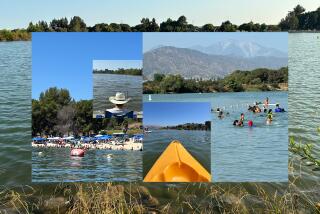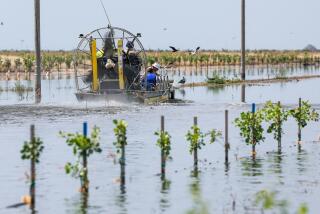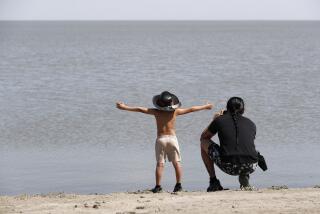Movement Would Thrust Greatness on Lake St. Clair
ST. CLAIR SHORES, Mich. — Standing on the edge of Lake St. Clair, the water stretches as far as one can see, beyond fishermen in motorboats in the foreground and long, narrow freighters far in the distance. Clearly, this is one big lake.
But is it a “Great Lake”?
Some would like it to be, and a movement to get Lake St. Clair named the sixth official Great Lake is getting underway. Jim LaHood thinks the idea is, well, a great one. “I’ve always considered Lake St. Clair the greatest of all the Great Lakes,” says LaHood, who owns Lakeshore Lanes, a bowling alley that his father built here in 1950.
“I’d get up every morning and look out on the lake,” says LaHood, stocky and tanned with a shock of white hair ringing his head. “Of course it’s a Great Lake. It’s not as big as the other Great Lakes, but you can’t see to the other side. It sure doesn’t feel like an inland lake.”
Lake St. Clair lies between southeast Michigan and Canada, just north of Detroit. Connecting Lake Huron to Lake Erie, it’s a critical passage on the shipping route stretching from Duluth, Minn., to the Atlantic Ocean. Three thousand freighters a year pass through it. Teeming with perch, walleye, bass and muskie, it’s home to more than 153,000 pleasure boats on the American side alone.
But at 670 square miles, it’s only one-eleventh the size of Lake Ontario -- the smallest of the five Great Lakes -- though more than three times the size of Lake Tahoe. Lake Superior is 47 times as large. And the lake is shallow, averaging only 10 feet except where the shipping channel has been dredged. At Metro Beach in Harrison Township, the biggest beach in the Detroit region, swimmers can wade out 300 feet and still be only waist deep.
Trying to classify it as a Great Lake is not so much for tourism or bragging rights as for federal grants that would accompany the designation and help clean up the frequently fouled waters.
Lack of water treatment facilities, funds and scientific data to better control the problem have led to raw sewage and chemical runoff, soil erosion and contamination, and alarmingly high levels of plant growth and E. coli bacteria in the lake.
“Ninety percent of the total flow into Lake Erie comes through us,” says Doug Martz, chairman of the Macomb County Water Quality Board and the driving force behind the sixth Great Lake campaign. “The majority of their pollution is coming from us.”
Martz says pregnant women and children shouldn’t eat fish out of Lake St. Clair. Recent tests have found E. coli concentrations at 170 times what is considered safe. He also complains that there’s little monitoring of more than 70 chemical plants and refineries upriver in Sarnia, Canada -- known locally as “Chemical Valley.”
Back in June 1994, there was a billion-gallon sewage spill when heavy rains caused retention basins to overflow. It closed many of the lake’s beaches, and excessive plant growth tangled the waters up to several hundred feet offshore. “You could walk on it and your feet would stay dry,” says Metro Beach Supt. Jim Pershing, still amazed.
Still, the lake has a romantic draw to those who live in the towns that ring it.
“It’s sort of a source of energy for me. I can walk to the end of my street and watch a sunrise,” says Tom Stanton, 41, a writer who lives a block from the lake in New Baltimore. He has gone boating and water skiing, summer and winter fishing and even cross-country skiing on the lake, which often freezes over in the winter.
Yet for all his fondness, Stanton is a skeptic about the Great Lake designation. “It’s a wonderful lake. But it’s not a Great Lake,” he says. “When you look at a map, you see that Lake St. Clair just doesn’t measure up.”
Even the pollution concerns aren’t persuading some residents to back Martz’s grass-roots campaign.
“I think it stinks,” Ed Fritz said of the idea as he packed up his motorboat and catch of about 30 perch at a loading dock in Harrison last week. “You’re going to have to change all the history books,” said the 76-year-old retiree who used to work on furnaces for Ford Motor Co.
His fishing buddy Larry Jeziorski, 63, a retired financial planner who remembers boating on Lake St. Clair in the 1940s when you could see the bottom, was more sympathetic to the notion of six Great Lakes.
“But I don’t know if it’s going to change anything,” said Jeziorski, who has been to all five Great Lakes but likes the fishing here best. “It’s a nice lake, but I don’t know if it’s a Great Lake.”
Some officials who work on lake and waterway issues are supportive of Martz’s efforts to clean up the lake, if not enthusiastic about the Great Lake designation. “I don’t think it needs to be designated a Great Lake to get attention,” says Jessica Opfer, executive director of the Clinton River Watershed Council in nearby Rochester Hills. “Most grant funding available to the Great Lakes system includes connecting waterways.” The 1970 Merchant Marine Act declared the Great Lakes system as “the nation’s fourth sea coast” and as part of that system, Lake St. Clair is eligible for some grants that come with the designation.
But Great Lakes Commissioner Michael Donahue, whose board represents eight states and two Canadian provinces, agrees that Lake St. Clair has fallen through the cracks. “It simply has not received the attention and funding it deserves from an economic and ecological standpoint.”
The commission isn’t taking a position on adding a Great Lake, although at least one member, Rex Damschroder of Ohio, is vehemently opposed. “It’s clearly not a Great Lake, neither in size nor volume,” he told the Detroit News last week.
Martz calls it the forgotten lake, insisting: “This lake has been lost, and I want it found again.”
A wiry, tireless fellow of 53 who says he works 60 hours a week on local water quality issues, Martz is somewhat of a showman. A few years ago he drove around Macomb County in a 1972 Cadillac Fleetwood with plungers mounted on the fenders and a toilet attached to the roof collecting signatures to support clean water initiatives.
At a Great Lakes Commission meeting in Cleveland last week, Martz passed out bumper stickers saying, “Lake St. Clair: Heart of the Great Lakes” and laid out his case to commissioners. No vote was taken; it’s up to Congress to elevate the lake’s status. The next step for Martz and fellow water quality board member Bill Smith, who is helping to spearhead the campaign, is to lobby U.S. senators and congress members.
It wouldn’t be the first effort to declare Great Lake No. 6. In 1998 Sen. Patrick Leahy of Vermont unsuccessfully sought an amendment to bestow the title to Lake Champlain, which sits between Vermont and New York. True Great Lakers snort at the thought. “That’s not even in our drainage basin,” says Commissioner Donahue.
Schoolchildren in America, no matter where they grow up, learn about the five Great Lakes in geography lessons. LaHood, the bowling alley owner, says Americans should know the name of Lake St. Clair as well.
“We’re very critical to the Great Lakes,” he says, “because we link it all together.”
More to Read
Sign up for Essential California
The most important California stories and recommendations in your inbox every morning.
You may occasionally receive promotional content from the Los Angeles Times.










